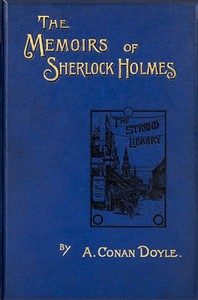The Memoirs of Sherlock Holmes by Arthur Conan Doyle (ebook reader for pc and android .txt) 📗

- Author: Arthur Conan Doyle
Book online «The Memoirs of Sherlock Holmes by Arthur Conan Doyle (ebook reader for pc and android .txt) 📗». Author Arthur Conan Doyle
“I have heard nothing of it.”
“It has not excited much attention yet, except locally. The facts are only two days old. Briefly they are these:
“The Royal Mallows is, as you know, one of the most famous Irish regiments in the British army. It did wonders both in the Crimea and the Mutiny, and has since that time distinguished itself upon every possible occasion. It was commanded up to Monday night by James Barclay, a gallant veteran, who started as a full private, was raised to commissioned rank for his bravery at the time of the Mutiny, and so lived to command the regiment in which he had once carried a musket.
“Colonel Barclay had married at the time when he was a sergeant, and his wife, whose maiden name was Miss Nancy Devoy, was the daughter of a former colour-sergeant in the same corps. There was, therefore, as can be imagined, some little social friction when the young couple (for they were still young) found themselves in their new surroundings. They appear, however, to have quickly adapted themselves, and Mrs. Barclay has always, I understand, been as popular with the ladies of the regiment as her husband was with his brother officers. I may add that she was a woman of great beauty, and that even now, when she has been married for upwards of thirty years, she is still of a striking and queenly appearance.
“Colonel Barclay’s family life appears to have been a uniformly happy one. Major Murphy, to whom I owe most of my facts, assures me that he has never heard of any misunderstanding between the pair. On the whole, he thinks that Barclay’s devotion to his wife was greater than his wife’s to Barclay. He was acutely uneasy if he were absent from her for a day. She, on the other hand, though devoted and faithful, was less obtrusively affectionate. But they were regarded in the regiment as the very model of a middle-aged couple. There was absolutely nothing in their mutual relations to prepare people for the tragedy which was to follow.
“Colonel Barclay himself seems to have had some singular traits in his character. He was a dashing, jovial old soldier in his usual mood, but there were occasions on which he seemed to show himself capable of considerable violence and vindictiveness. This side of his nature, however, appears never to have been turned towards his wife. Another fact, which had struck Major Murphy and three out of five of the other officers with whom I conversed, was the singular sort of depression which came upon him at times. As the major expressed it, the smile had often been struck from his mouth, as if by some invisible hand, when he has been joining the gayeties and chaff of the mess-table. For days on end, when the mood was on him, he has been sunk in the deepest gloom. This and a certain tinge of superstition were the only unusual traits in his character which his brother officers had observed. The latter peculiarity took the form of a dislike to being left alone, especially after dark. This puerile feature in a nature which was conspicuously manly had often given rise to comment and conjecture.
“The first battalion of the Royal Mallows (which is the old 117th) has been stationed at Aldershot for some years. The married officers live out of barracks, and the Colonel has during all this time occupied a villa called Lachine, about half a mile from the north camp. The house stands in its own grounds, but the west side of it is not more than thirty yards from the high-road. A coachman and two maids form the staff of servants. These with their master and mistress were the sole occupants of Lachine, for the Barclays had no children, nor was it usual for them to have resident visitors.
“Now for the events at Lachine between nine and ten on the evening of last Monday.”
“Mrs. Barclay was, it appears, a member of the Roman Catholic Church, and had interested herself very much in the establishment of the Guild of St. George, which was formed in connection with the Watt Street Chapel for the purpose of supplying the poor with cast-off clothing. A meeting of the Guild had been held that evening at eight, and Mrs. Barclay had hurried over her dinner in order to be present at it. When leaving the house she was heard by the coachman to make some commonplace remark to her husband, and to assure him that she would be back before very long. She then called for Miss Morrison, a young lady who lives in the next villa, and the two went off together to their meeting. It lasted forty minutes, and at a quarter-past nine Mrs. Barclay returned home, having left Miss Morrison at her door as she passed.
“There is a room which is used as a morning-room at Lachine. This faces the road and opens by a large glass folding-door on to the lawn. The lawn is thirty yards across, and is only divided from the highway by a low wall with an iron rail above it. It was into this room that Mrs. Barclay went upon her return. The blinds were not down, for the room was seldom used in the evening, but Mrs. Barclay herself lit the lamp and then rang the bell, asking Jane Stewart, the housemaid, to bring her a cup of tea, which was quite contrary to her usual habits. The Colonel had been sitting in the dining-room, but hearing that his wife had returned he joined her in the morning-room. The coachman saw him cross the hall and enter it. He was never seen again alive.
“The tea which had been ordered was brought up at the end of ten minutes; but the maid, as she approached the door, was surprised to hear the voices of her master and mistress in furious altercation. She knocked without receiving any answer, and even turned the handle, but only to find that the door was locked upon the inside. Naturally enough she ran down to tell the cook, and the two women with the coachman came up into the hall and listened to the dispute which was still raging. They all agreed that only two voices were to be heard, those of Barclay and of his wife. Barclay’s remarks were subdued and abrupt, so that none of them were audible to the listeners. The lady’s, on the other hand, were most bitter, and when she raised her voice could be plainly heard. ‘You coward!’ she repeated over and over again. ‘What can be done now? What can be done now? Give me back my life. I will never so much as breathe the same air with you again! You coward! You coward!’ Those were scraps of her conversation, ending in a sudden dreadful cry in the man’s voice, with a crash, and a piercing scream from the woman. Convinced that some tragedy had occurred, the coachman rushed to the door and strove to force it, while scream after scream issued from within. He was unable, however, to make his way in, and the maids were too distracted with fear to be of any assistance to him. A sudden thought struck him, however, and he ran through the hall door and round to the lawn upon which the long French windows open. One side of the window was open, which I understand was quite usual in the summer-time, and he passed without difficulty into the room. His mistress had ceased to scream and was stretched insensible upon a couch, while with his feet tilted over the side of an armchair, and his head upon the ground near the corner of the fender, was lying the unfortunate soldier stone dead in a pool of his own blood.





Comments (0)